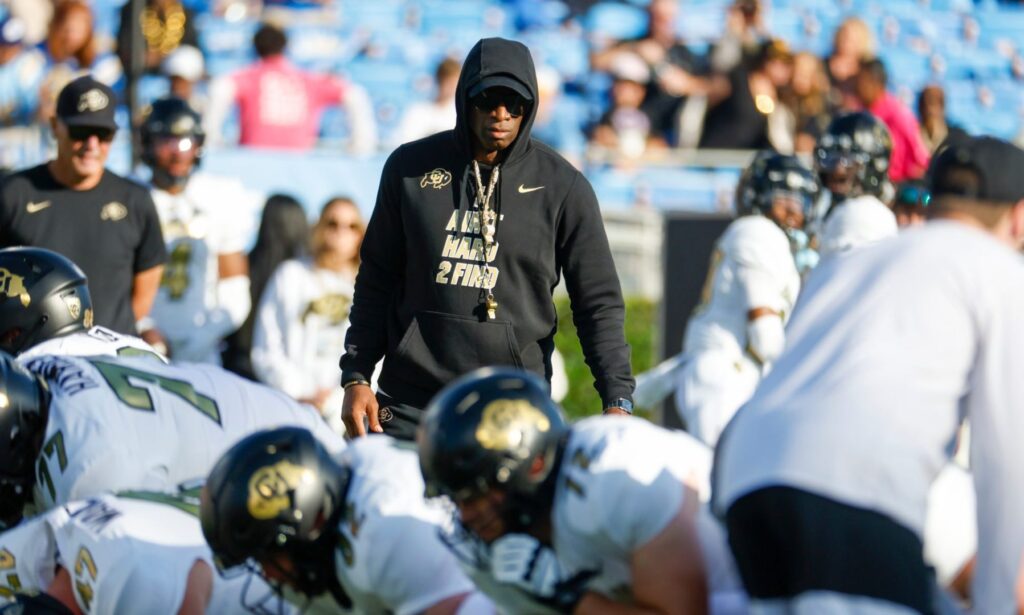In Boulder, Colorado, a culinary revolution is brewing alongside a football renaissance. The Buff, a beloved breakfast and brunch spot, has become ground zero for the fervor surrounding the University of Colorado’s football program under new head coach Deion Sanders.
Known for its 99-cent mimosas and hearty fare, The Buff exemplifies the transformative power of “Coach Prime‘s” arrival. As the Buffaloes’ on-field fortunes rise, so too does the buzz in local establishments.
Dru Libby, manager at The Buff, has witnessed the change firsthand. “Home games now? We’re doubling our orders and maxing out staff,” he says. This surge in business isn’t isolated; it’s a microcosm of Boulder’s broader economic uplift.
The Boulder Convention and Visitors Bureau reports staggering numbers: six home games last year generated $113.2 million in economic activity. Visitor spending has skyrocketed, with the average guest now shelling out $183 for accommodations, a stark increase from $102 just six years ago.
But as the saying goes, with great power comes great responsibility. The question on everyone’s lips: How many wins does Colorado need to deem this season a success?
After a 4-8 record in Sanders’ inaugural year, expectations are soaring. The Buffs currently stand at 4-1, fresh off a victory against UCF. For a program that’s only seen two bowl games since 2008, the prospect of postseason play has fans buzzing with anticipation.
Tyler Odorisio, a die-hard Buffs supporter, encapsulates the collective sentiment: “There’s a lot of hype around this team and this program. We finally got a little glimmer of hope here. Now, we just want to capitalize and see some wins.”
The Sanders effect extends far beyond the gridiron. His arrival has turned Colorado into a magnet for top-tier talent, with over two dozen four- and five-star recruits flocking to Boulder. It’s a stark contrast to the program’s recent past, where attracting elite players was an uphill battle.
Sanders’ weekly press conferences have become must-see events, often highlighting impressive statistics that underscore the program’s meteoric rise. From increased NFL scout attendance to skyrocketing TV viewership, the numbers tell a story of a program reborn.
“Whether people like it or not, they’re watching,” Sanders remarked, a nod to the newfound visibility of CU football.
Yet, in the high-stakes world of college football, excitement alone doesn’t fill trophy cases. Jeremy Bloom, once considered the most significant Buffalo of the 21st century and instrumental in bringing Sanders to Boulder, puts it bluntly: “Absolutely, he needs to win. This is a performance business.”
As the season unfolds, fans dare to dream of a College Football Playoff appearance, a feat that seemed laughably distant just a year ago. However, whispers of concern circulate about Sanders’ long-term commitment to CU, especially with his sons Shedeur and Shilo set to graduate after this season.
Sanders, for his part, has been quick to quash such doubts. “I tell them I’m a father, not a baby daddy,” he asserts, emphasizing his dedication to building a lasting legacy at Colorado rather than simply following his children’s careers.
The impact of “Prime Time” in Boulder transcends the boundaries of Folsom Field. It’s about a community rediscovering its passion, a city experiencing an economic renaissance and a football program reclaiming its place in the national conversation.
Back at The Buff, the mimosas flow as freely as the optimism. Each packed house on game day is a testament to the symbiotic relationship between town and team. The restaurant’s success mirrors that of countless local businesses riding the wave of renewed interest in all things Boulder.
As the Buffaloes continue their march through the season, the eyes of the college football world remain fixed on this Rocky Mountain revolution. The question isn’t just whether Sanders can sustain the on-field success, but whether this cultural and economic boom can become the new normal for Boulder.
For now, the city basks in the glow of national attention, savoring each victory and each packed restaurant as a sign of brighter days ahead. The Sanders era may still be in its infancy, but its impact is already being felt in every corner of this college town.
Libby, surveying his bustling restaurant, sums up the prevailing attitude: “We’d love to keep him. And if not, we’re still going to put the same heart and love into what we do here.”
As autumn deepens and the stakes grow higher with each passing week, one thing is certain: Boulder is alive with a passion for football not seen in generations. Whether this fever pitch can translate into sustained success remains to be seen, but for now, the city is all in on the Prime Time experience.




